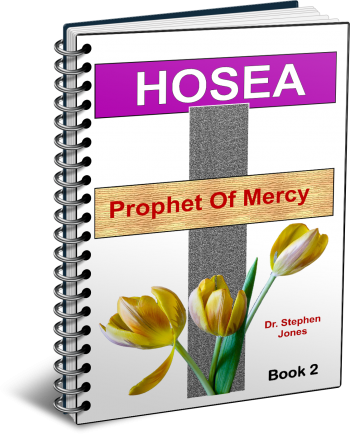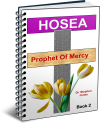Latest Posts
View the latest posts in an easy-to-read list format, with filtering options.

Hosea's failed marriage was a prophetic type of God's failed marriage with Israel. Hosea's harlot wife, Gomer, was named to represent Israel, because Gomer was the official name which the Assyrians called Israel. Her divorce and subsequent redemption shows the mercy of God.
Category - Bible Commentaries

In Hosea 9:1-4 the prophet pursues the “eating” theme that he began in Hosea 8:13. The word “eat” used in verses 3 and 4 is from the Hebrew word akal. The same word is used later in Hosea 10:13, where the prophet tells them, “you have eaten the fruit of lies.” Hosea 9:1-4 says,
1 Do not rejoice, O Israel, with exultation like the nations! For you have played the harlot, forsaking your God. You have loved harlots’ earnings on every threshing floor. 2 Threshing floor and wine press will not feed them, and the new wine will fail them. 3 They will not remain in the Lord’s land, but Ephraim will return to Egypt, and in Assyria they will eat unclean food. 4 They will not pour out libations of wine to the Lord, their sacrifices will not please Him. Their bread will be like mourners’ bread; all who eat of it will be defiled.
If Israel had truly followed Yahweh, the God of Israel, then eating the sacrifices offered for sin would have had a remedial effect upon them, because their sin would have been covered. But the prophet says that Israel was eating and drinking “harlots’ earnings.” In other words, they were eating from the wrong tree, and this is a metaphor that refers to the Garden of Eden. To eat of the forbidden tree was to eat “the fruit of lies” spoken by the serpent. It caused them to follow after idols (foreign gods), thus making Israel a harlot.
The result was that Israel “will not remain in the Lord’s land,” but will be sent to “Egypt” and “Assyria,” where “they will eat unclean food.” In other words, the food of idolatry which they had desired in the land of Israel was to become their staple diet during their captivity.
It is a spiritual principle that God judges us by giving us the desires of our unclean hearts. Recall from Num. 11:4 and 10 how the people wept like children, desiring flesh to eat. They were tired of manna and despised it, not realizing that they were actually despising Jesus Christ Himself, for He told the people in John 6:48-51,
48 I am the bread of life. 49 Your fathers ate the manna in the wilderness, and they died. 50 This is the bread which comes down out of heaven, so that one may eat of it and not die. 51 I am the living bread that came down out of heaven…”
In preferring flesh (i.e., fleshly religion ruled by men), they rejected Christ. So God gave them flesh every day for an entire month (Num. 11:18-20). The result in seen in Num. 11:33, 34,
33 While the meat was still between their teeth, before it was chewed, the anger of the Lord was kindled against the people, and the Lord struck the people with a very severe plague. 34 So the name of that place was called Kibroth-hattaavah, because there they buried the people who had been greedy.
The name of the place means “graves of lust” (or greed). Kibroth means “graves,” and hattaavah means “lust, desire, the longing of one’s heart, covetousness.” Covetousness is the equivalent of idolatry, as Paul tells us in Col. 3:5 (KJV). Fleshly food defiles us, for Hosea 9:4 says, “all who eat of it will be defiled.” The psalmist comments on Israel’s lust longing for meat (flesh), saying in Psalm 106:13-15,
13 They quickly forgot His works; they did not wait for His counsel, 14 but craved intensely in the wilderness, and tempted God in the desert. 15 So He gave them their request, but sent a wasting disease [razown, “leanness, scantiness, wasting”] among them.
To feed the desires of the flesh is to bring weakness and leanness to the spiritual man within us. But if we desire fleshly religion, God will give us plenty of it, and it will defile us. We will experience spiritual leanness until we learn to recognize the unfavorable results of those desires. Those who are wise will recognize that this lean spiritual condition is not really what they want, and they will seek for the solution. Those who seek Him with all their hearts will find Him. In Jer. 29:10, 12-14 God says,
10 “For thus says the Lord, “When seventy years have been completed for Babylon, I will visit you and fulfill My good word to you, to bring you back to this place… 12 Then you will call upon Me and come and pray to Me, and I will listen to you. 13 And you will seek Me and find Me, when you search for Me with all your heart. 14 And I will be found by you,” declares the Lord…
Such is the case for all who truly seek Him. However, no one truly seeks Him unless God implants that desire within his heart. That desire is implanted within the hearts of the overcomers, but not in the general population, nor even in the church as a whole, which (as a general rule) prefers fleshly religious forms.
So in practice, we see that captivity is a time when most of the people—even religious people—are given over to the lusts of the flesh until their time of captivity is complete. For Judah it was seventy years, but for Israel it was much longer, for they were sentenced to a captivity of “seven times,” or 2,520 years. During that time, as Amos 8:12 says, “they will go to and fro to seek the word of the Lord, but they will not find it.”
This does not mean that they were without religion, nor even that they were without Christian religion. Many of the dispersed Israelites immigrated into Europe after Assyria fell in 612 B.C. There they were converted to Christianity as a religion.
One might argue that this resolved some of the problems associated with their captivity, but church history shows that most of them continued to follow men, rather than Christ. They swore allegiance to church leaders in the name of Jesus. Their eternal destiny depended upon their relationship to the organization and to the church hierarchy, rather than upon Jesus Himself. Hence, they did not seek Christ with their whole heart, because Christ was given second place after the church and its leaders.
The mark of an overcomer is not perfection, but a desire to seek God with his or her whole heart. The rest are blinded, Paul says.
Hosea 9:5 continues,
5 What will you do on the day of the appointed festival and on the day of the feast of the Lord?
The prophet does not specify any particular feast of the Lord here. It is a rhetorical question about how one treats these feast days. We might ask more specifically, “What will you do about the feast of Passover? What will you do about Pentecost? What will you do about Tabernacles? Do you keep these feasts in the way God has decreed? Are these only religious holidays, or do you keep them in your heart?”
First and foremost, these feasts are all supposed to be kept in the place where God had chosen to place His name. This is commanded in Deut. 16:2, 5, 6, regarding the feast of Passover, Deut. 16:11 in regard to Pentecost, and Deut. 16:15 in regard to Tabernacles. When Israel entered Canaan, they had to go to “Shiloh, where I made My name to dwell at the first” (Jer. 7:12). When that location became corrupt, God moved to Jerusalem and placed His name there (Jer. 7:10).
When that location became corrupt, God moved again, finally placing His name in a spiritual temple in the New Jerusalem. Our bodies are now the temples in which God has placed His name (1 Cor. 3:16), and for this reason, His name is now on our foreheads (Rev. 22:4). This, then, is the only lawful place today where one can keep a feast. Those who do not understand this try to keep feasts in the old Jerusalem or in some other location, as if His name were still in external pieces of real estate.
So Hosea’s question is still very relevant today. What will you do about the appointed festivals? Will you keep them in an Old Covenant manner, killing lambs at Passover and putting blood on your doorposts? Will you offer God whole wheat bread baked with yeast on Pentecost? Will you dwell in a tent for a week during Tabernacles? There is nothing wrong per se with doing these things, if we treat these actions as teaching tools or as convenient gatherings.
The problem comes when we perform carnal religious rituals, thinking that we are keeping the feasts by doing so. No, to keep Passover, one must apply the blood of the true Lamb of God to our own “house” in the altar of the heart in order to receive justification by faith in His blood. The blood of animals is now insufficient to please God. To keep Pentecost, one must be filled with the Spirit. An offering of bread is insufficient. To keep Tabernacles, one must be changed into His likeness and have the law written on his heart.
Many today have kept the first two feasts, but the third is yet to be fulfilled. Meanwhile, we prepare to fulfill Tabernacles by studying the law and the principles of Sonship. When we truly eat the word, we will no longer be defiled, for Jesus said that the word alone makes us clean (John 15:3).